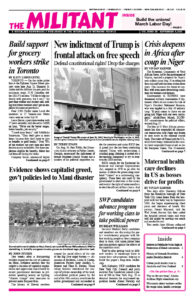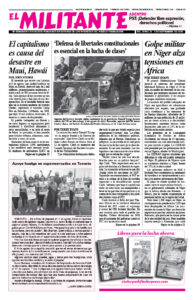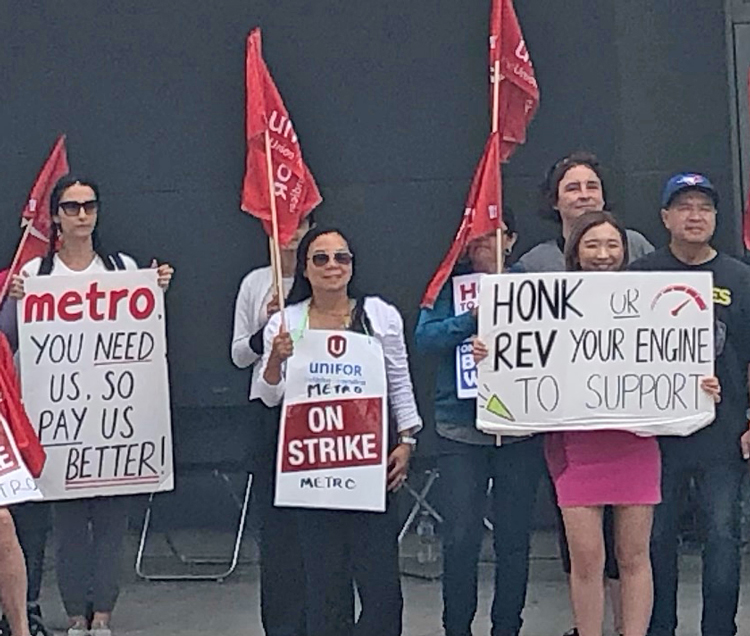TORONTO — On the strike picket line at the Eglinton Square Metro grocery store here Aug. 11, Shannyn St. Aubin told the Militant she gets paid the minimum wage, 15.50 Canadian dollars ($11.47) an hour. “I’d like to help my family with groceries, but I can’t,” the part-time worker and student said, adding that Metro workers don’t get an employee discount on purchases.
Over 3,700 Unifor union Local 414 members at 27 Toronto-area Metro stores went on strike July 29.
Laura Barter, a part-time worker with 17 years seniority, said she earns CA$18 an hour. “We’re out for better wages, better benefits, job security.”
“I need more hours,” said Subhiksha Srinivasan. “They don’t give us more hours because they don’t want to give us benefits or paid breaks.” Over 70% of the workers are part time and have limited access to benefits. For those employees eligible for benefits, Metro has cut them off during the strike.
Company bosses announced higher than expected third-quarter profits Aug. 9: “Adjusted net earnings were $314.8 million compared to $283.8 million last year, a 10.9% increase.”
Working two part-time jobs, 31-year-old Sheldon Scantlebury has been at Metro for 10 years. “When I first started striking, I thought people would be negative,” he said. “But they’re very supportive. They complain about the high prices, and say, ‘They charge us $6 for bread, they can afford to pay you more.’”
Employers and government spokespeople in Canada have been touting the recent announcement that the official inflation rate is down to around 3%. But working people are only too aware of what necessities are going for. The cost of a typical bag of groceries has increased by 20% in the past two years, Toronto Dominion Bank senior economist Leslie Preston reported.
Widespread solidarity
Some neighbors come by the store to drop off homemade pastries, water and donuts for the strikers, while others pick up a union flag themselves and join the line. “A guy pulled up in his car and said, ‘The film industry is shut down, the Emmys are cancelled, can I join your line?’” Jose de Villa, head picket captain at the Metro store on Kennedy Road and Highway 401, reported. “‘I want to fight with you because I know you’ll fight for us.’” The Unifor strike supporter was referring to the current strike by actors and writers in the U.S.
Retired UPS dispatcher Reginald Housand talked with this worker-correspondent when I knocked on his door in the neighborhood. “Even though it’s inconvenient, I support them. They should get what they deserve,” he said, adding that he’s gone to the picket line across the street from his apartment to sit with the strikers in his wheelchair.
Ontario Public Service Employees Union member Susan Berman described an Aug. 17 union solidarity delegation from her workplace that she joined. “Seven of us went. We chanted and got constant, loud honks of support, and cyclists rang their bells. Strikers thanked us for coming. One said it was the best day ever on the line. One of my co-workers said this was good preparation in case we strike some time.”
Two weeks into the conflict, Metro requested government mediation. Unifor refused. “Metro cannot strong-arm workers to accept a lesser contract. They must return to the table with an offer that takes workers’ demands seriously,” said Local 414 President Gord Currie. The strike began after union members voted down a tentative agreement between Unifor and Metro because the wage gains didn’t match rising costs for necessities.
Metro workers are just the first of more than 11,000 Unifor-organized grocery store workers in eastern Canada whose contracts are running out, and their fight stands to set the bar. Help get the word out. Join a picket line. Send solidarity messages to 414contact@uniforlocal414.ca.


